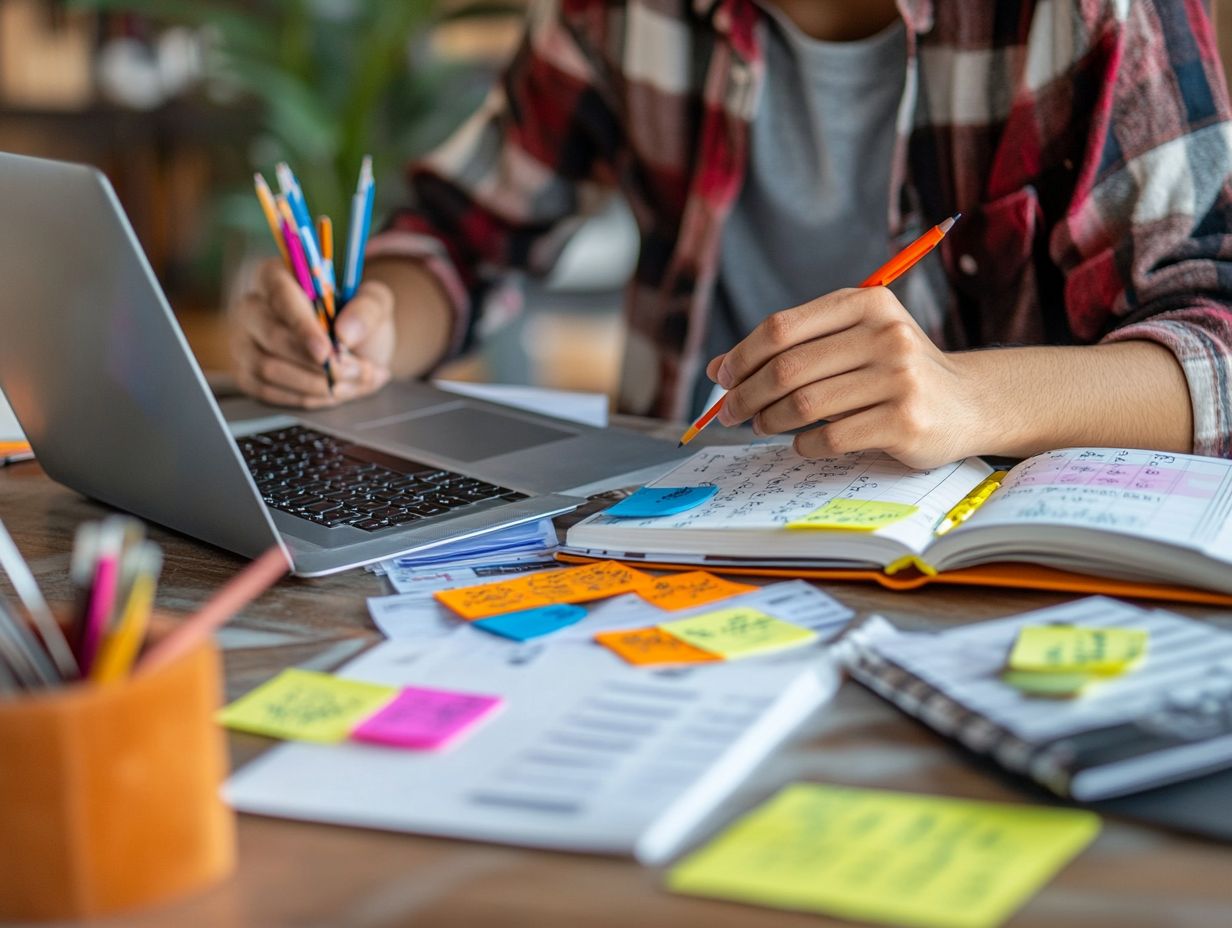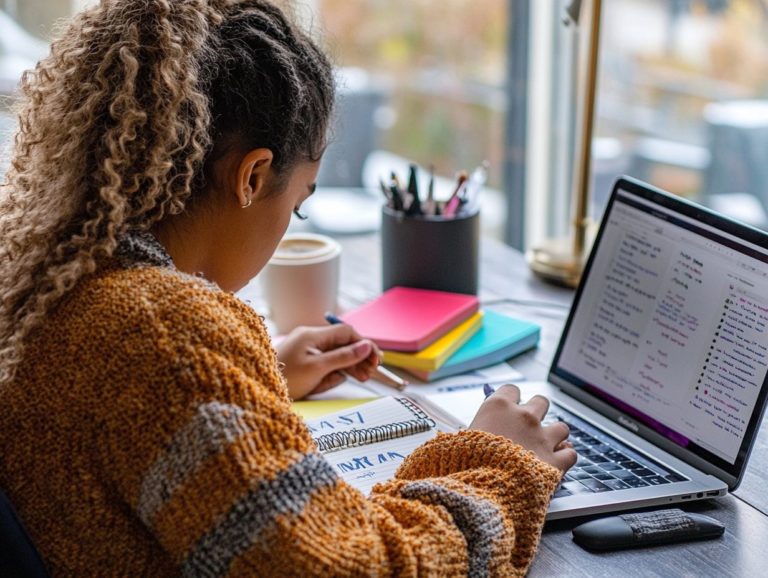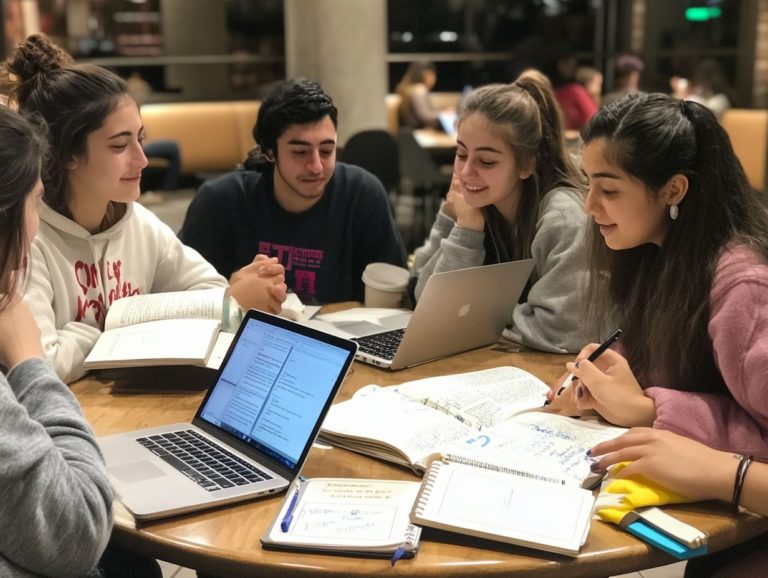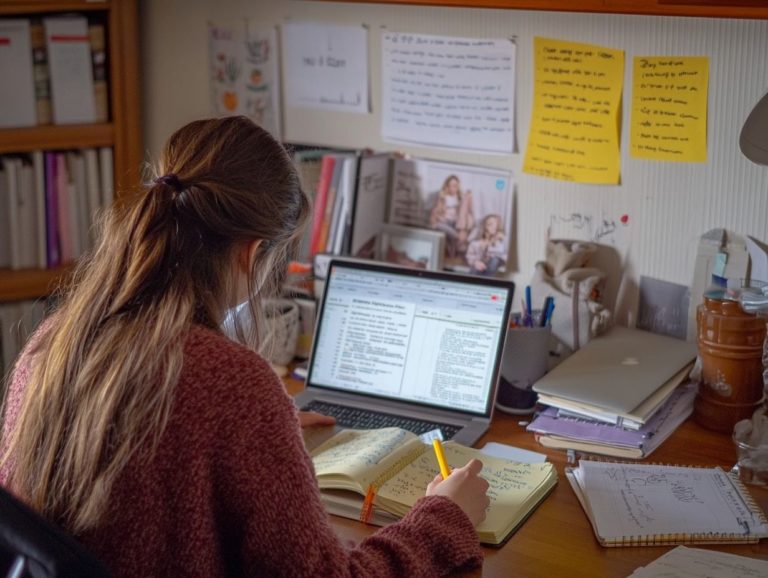how to customize your study approach for tests
Understanding your unique learning style is essential for maximizing your study effectiveness and enhancing your test preparation. This guide will assist you in identifying your preferred study methods and setting realistic goals, allowing you to create a personalized study plan tailored just for you.
You ll uncover active learning techniques, effective study aids, and strategies to maintain motivation while managing distractions. This guide also covers test day best practices and strategies to overcome anxiety, ensuring you are thoroughly prepared to showcase your knowledge.
Don t miss out on this chance to supercharge your study habits now!
Contents
- Key Takeaways:
- Understanding Your Learning Style
- Setting Goals and Creating a Study Plan
- Effective Study Techniques
- Staying Motivated and Focused
- Preparing for the Test
- Frequently Asked Questions
- What is meant by customizing your study approach for tests?
- Why is it important to customize your study approach for tests?
- How do I identify my learning style?
- What are some ways to customize my study approach for tests?
- How do I know if my customized study approach is effective?
- What should I do if my customized study approach is not working?
Key Takeaways:

Discover your learning style to tailor your study approach for tests. Set achievable goals and create a study plan for test preparation with a timeline to prep effectively. Use active learning strategies and study aids to stay motivated and focused.
Understanding Your Learning Style
Understanding your learning style is vital for achieving academic success, especially for college and high school students navigating various courses and teaching methods.
By identifying your preferred study techniques and aligning your approach with your unique learning preferences, you can elevate your study skills and learn how to develop a test preparation schedule to enhance your overall academic performance.
This personalized focus boosts retention and promotes effective studying, enabling you to engage more actively with the material. Ultimately, this can lead to outstanding results in the classroom.
Identifying Your Preferred Study Methods
Identifying your preferred study methods requires understanding how you absorb information. Whether you learn best through visuals, discussions, or hands-on experiences, this self-awareness can boost your study sessions.
If you re a visual learner, utilizing flashcards can be especially beneficial, allowing you to engage with terms and concepts through repetition. On the other hand, if you thrive in collaborative settings, discussing topics aloud or forming study groups may enhance your understanding significantly.
If you think spatially, concept maps can act as roadmaps, illustrating the relationships between ideas in a way that makes sense to you.
Incorporating self-testing, or quizzing yourself, can further cement your knowledge retention. This practice can shine a light on areas that might need more attention. By actively engaging with study materials in a manner that resonates with your learning style, you position yourself for greater academic success.
Setting Goals and Creating a Study Plan
Establishing clear goals and making a well-structured study plan is crucial for effective preparation and time management, especially for those striving for academic excellence.
A thoughtfully designed study routine organizes your study sessions and enhances your study skills by offering a clear roadmap to achieve your learning objectives.
By focusing on strategic preparation and maintaining discipline, you can optimize your study methods and elevate your academic performance to new heights.
Creating a Realistic Timeline
A realistic study timeline helps you balance your subjects with personal commitments. Look at your workload and each subject’s needs to prioritize effectively. Identifying deadlines and exam dates is crucial, as they significantly influence how much time you should dedicate to each topic.
Implementing effective strategies, like breaking larger tasks into smaller, manageable segments, can help you fend off procrastination. Utilizing a calendar or productivity app to track your progress provides visual motivation and enables you to adjust your timeline as needed.
This way, you remain aligned with your goals and can adapt effortlessly to any changes in your schedule.
Breaking Down Material into Manageable Chunks

Breaking down course material into manageable chunks is an essential study technique that enhances your reading comprehension and alleviates feelings of overwhelm during intense study sessions.
By utilizing methods like concept maps or summarizing notes, you can effectively organize information, bringing key concepts and relationships between ideas into clearer focus. This visual and tactile approach aids in retention and simplifies the recall of details during exams.
Creating a study environment free from distractions such as electronic devices and background noise allows you to engage more deeply with the material. Strategic information chunking and a conducive study setting can significantly elevate your academic performance and pave the way for a more productive and enriching learning experience.
Effective Study Techniques
Effective study techniques are vital for maximizing your learning outcomes and ensuring you actively engage with your course material, which ultimately enhances retention and understanding.
Approaches like retrieval practice the act of recalling information from memory and self-testing not only reinforce your knowledge but also foster a deeper engagement with the content, leading to improved memory performance and greater academic success.
By integrating a variety of study aids and resources, you can elevate these techniques. Transform your study sessions into a more effective and enjoyable experience!
Active Learning Strategies
Active learning strategies invite you to engage with the material in a hands-on manner, helping you think critically and deepening your understanding of the subject. These approaches give you the power to take charge of your education by immersing yourself in collaborative efforts and real-world problem-solving.
In classroom settings, for example, group discussions allow you to exchange ideas and challenge one another s perspectives, enriching your grasp of key concepts. Peer teaching offers the opportunity to reinforce your knowledge by explaining topics to your classmates, solidifying your learning.
Problem-solving activities during individual study sessions, such as tackling practice questions or case studies, compel you to apply your knowledge actively. This iterative process enhances your comprehension and retention of information.
Making Use of Study Aids and Resources
Utilizing study aids and resources like study guides, textbooks, and flashcards can dramatically elevate your study experience and boost your academic performance.
By incorporating these tools into your routine, grasping complex concepts becomes much easier, and your ability to retain information improves significantly.
Explore various digital platforms and apps designed to enhance your study methods, as personalized approaches often lead to superior results.
Academic coaching frequently offers access to resources that match your learning style be it visual, auditory, or kinesthetic.
By pinpointing which study aids resonate most with your habits, you can create a customized study environment that ignites your motivation and engagement. Consider exploring how to use study groups for test-taking success to enhance your preparation. Start using these techniques today to see immediate improvements in your study habits!
Staying Motivated and Focused
Staying motivated and focused during your study sessions is essential for cultivating effective studying habits and achieving academic success.
By implementing strategies that minimize distractions and foster an optimal study environment, you can significantly enhance your attention span and commitment to your study routine.
Incorporating breaks and rewards boosts your motivation, transforming the learning process into a more enjoyable and productive experience.
Managing Distractions and Beating Procrastination

Managing distractions and beating procrastination are key to optimizing your study time! Establish a dedicated study space free from interruptions, perhaps a quiet corner in your home or a cozy nook in a local library.
Embracing technology can also be a game changer. Consider utilizing apps that limit social media interactions to create a focused environment perfect for learning.
Prioritizing tasks is equally important. Tackle urgent assignments first and allocate specific times for studying.
Take a moment to reflect on your personal study habits. This can reveal triggers for procrastination and empower you to develop tailored strategies that work best for you.
Preparing for the Test
Preparing for a test demands a strategic approach and an emphasis on best practices, including how to find the right study materials for tests, that can elevate your exam performance and instill confidence.
Use effective study techniques like retrieval practice and self-testing. Additionally, learning how to stay organized during test prep can help reinforce your understanding and prepare you for the test.
Crafting a detailed study plan will streamline your study process and alleviate any anxiety you might feel on test day.
Best Practices for Test Day
On test day, embracing best practices can make all the difference. Begin with strategic time management and familiarize yourself with the exam format to optimize your performance.
Sleep well the night before. A good night’s rest can help enhance your concentration. Complement this with a nutritious breakfast to fuel both your body and mind.
Arriving at the exam location early gives you ample time to settle in, easing any pre-test anxiety. Once you’re seated, maintaining a calm demeanor is key. If nerves start to creep in, take a few deep breaths and keep an eye on the clock.
Effective time management during the test is vital. Allocate specific minutes for each section to boost your focus and ensure comprehensive responses.
Managing Test Anxiety
Managing test anxiety is essential for achieving academic success and performing at your best during exams. With the pressures of deadlines and expectations looming, discovering effective strategies to calm your nerves can profoundly influence your overall performance.
Practice mindfulness daily to stay centered and clear your mind of distractions. Engaging in deep breathing exercises can offer immediate relief, enabling you to refocus during high-stress moments.
Utilizing positive visualization techniques encourages you to imagine success, reinforcing your confidence in your abilities. By seamlessly integrating these relaxation techniques into your study sessions, you can gradually build resilience and cultivate a sense of preparedness and self-assurance for test day.
Frequently Asked Questions
What is meant by customizing your study approach for tests?

Customizing your study approach for tests means tailoring your study methods and techniques to best suit your individual learning style and the specific requirements of the test you are preparing for. Learning how to develop a personal test-taking strategy can enhance your effectiveness during exams.
Why is it important to customize your study approach for tests?
Every student learns differently, and no two tests are exactly alike. By customizing your study approach and knowing how to switch between study techniques, you can optimize your learning and improve your chances of success on the test.
How do I identify my learning style?
Some common learning styles include visual, auditory, and kinesthetic. You can identify your learning style by reflecting on how you learn best, such as through visual aids, listening to lectures, or hands-on activities.
What are some ways to customize my study approach for tests?
Some ways to customize your study approach include using study aids and resources that align with your learning style, creating a study schedule that works for you, and promoting healthy study habits for tests specific to the type of test you will be taking.
Ready to customize your study approach? Start today for better results!
How do I know if my customized study approach is effective?
To know if your study approach works, regularly check your understanding and retention of the material.
Track your test scores and compare them to past results to see if you re improving.
What should I do if my customized study approach is not working?
If your study method isn t working, take action! Don t hesitate to make changes.
Try different study methods. Seek help from a teacher or tutor if needed.
Remember, everyone learns differently! Embrace the trial and error process to discover what works best for you!





